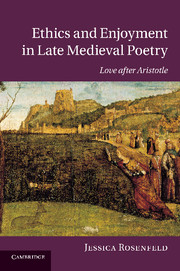Book contents
- Frontmatter
- Contents
- Acknowledgments
- Introduction: love after Aristotle
- 1 Enjoyment: a medieval history
- 2 Narcissus after Aristotle: love and ethics in Le Roman de la Rose
- 3 Metamorphoses of pleasure in the fourteenth-century dit amoureux
- 4 Love's knowledge: fabliau, allegory, and fourteenth-century anti-intellectualism
- 5 On human happiness: Dante, Chaucer, and the felicity of friendship
- Coda: Chaucer's philosophical women
- Notes
- Bibliography
- Index
- CAMBRIDGE STUDIES IN MEDIEVAL LITERATURE
3 - Metamorphoses of pleasure in the fourteenth-century dit amoureux
Published online by Cambridge University Press: 04 February 2011
- Frontmatter
- Contents
- Acknowledgments
- Introduction: love after Aristotle
- 1 Enjoyment: a medieval history
- 2 Narcissus after Aristotle: love and ethics in Le Roman de la Rose
- 3 Metamorphoses of pleasure in the fourteenth-century dit amoureux
- 4 Love's knowledge: fabliau, allegory, and fourteenth-century anti-intellectualism
- 5 On human happiness: Dante, Chaucer, and the felicity of friendship
- Coda: Chaucer's philosophical women
- Notes
- Bibliography
- Index
- CAMBRIDGE STUDIES IN MEDIEVAL LITERATURE
Summary
With the translation of classical texts into the vernacular, the fourteenth century marks not only an increased dissemination of scholarly and classical knowledge, but, as Claire Sherman has put it, “the development of modern languages as instruments of abstract and scientific thought.” Nicole Oresme's 1370 translation of the Nicomachean Ethics, commissioned by Charles V, alone coined dozens of words in French that are still in current use, including abstraccion, contingentes, delectacion, and sujet, and Oresme took care to include a “table des moz divers et estranges” at the end of his translation. Even earlier, great portions of the Nicomachean Ethics and Aquinas' commentary were translated in a treatise titled Li Ars d'Amour, de Vertu et de Boneurté; the author included a glossary of technical terms such as abis, fins, quidités, and philosophie (defined as “amours de savoir, de viertut ou de verité”). The discursive matrix of philosophy and poetry developed in thirteenth-century Paris was thus perpetuated by a widening audience for “scholastic” texts and by increasingly philosophical vernacular languages, an environment that contributed to the intellectualization of erotic poetry alongside the impact of the Roman de la Rose – perhaps the most influential medieval vernacular poem after Dante's Commedia. As the vernacular and courtly turned toward the intellectual, the concerns of the university were already oriented toward love. An Aristotelian ethical focus on earthly life and the curricular prominence of Peter Lombard's Sentences generated concerns about the relationships between love and pleasure, and love and loss, and about the nature of beatific enjoyment.
- Type
- Chapter
- Information
- Ethics and Enjoyment in Late Medieval PoetryLove after Aristotle, pp. 74 - 106Publisher: Cambridge University PressPrint publication year: 2010



